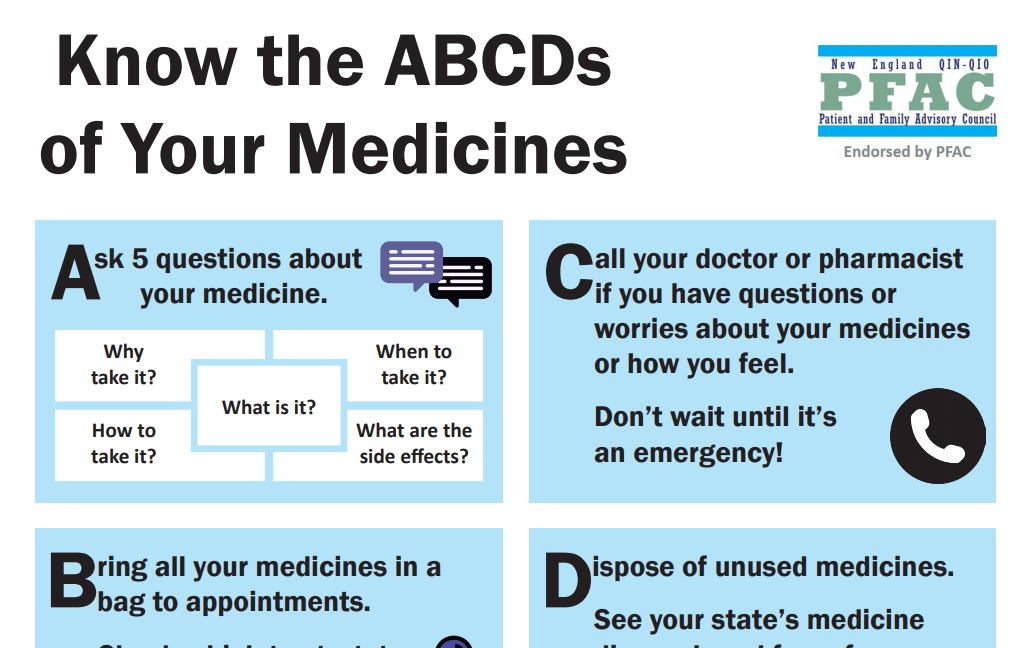Patient handout, primarily for transitions of care.

Patient handout, primarily for transitions of care.

This is designed for use in any facility by staff or a healthcare provider. Improvement of cross-setting management of diabetes medications during transitions of care to prevent adverse drug events and subsequently reduce emergency department visits, hospitalizations, and readmissions.
This is designed for use in any facility by staff or a healthcare provider. Improvement of cross-setting management of anticoagulants during transitions of care to prevent adverse drug events and subsequently reduce emergency department visits, hospitalizations, and readmissions.
This is designed for patients. It helps patients determine if they are ok with their anticoagulant treatment, should contact their doctor or go to the ED.
This is designed for nursing home staff, and other facilities could use it as well. It has information about ADEs including: definition, facts, common ADEs, and occurrences that could point to an ADE.
This is designed for use by nursing home staff, and could be used on other settings. It has information for identification of ADEs including: ADE definition, quick facts, common ADEs, and occurrences that could point to an ADE.
This is suitable for Nursing Homes, and could be used for other settings. It is intended to educate staff on adverse drug events (ADEs) including definition, identification, common ADEs, causes of ADEs, and generalized facts about ADEs.
This website contains the MDS 3.0 RAI Manual v1.17.1 and MDS forms, effective October 1, 2019. This version of the MDS 3.0 RAI Manual incorporates clarifications to existing coding and transmission policy; it also addresses clarifications and scenarios concerning complex areas. Since the preliminary release of the manual on May 20, 2019, changes have been made to clarify which assessments swing bed providers must complete; the definition of the “interruption window” for interrupted Part A-covered stays; the coding of item I0200B; and changes related to group therapy policies, as well as other corrections. Please see the document titled “MDS 3.0 RAI Manual v1.17.1 Replacement Manual Pages and Change Tables_October 2019” posted in the Related Links section at the bottom of this page.
General tips to follow to communicate appropriately and respectfully with and/or about an individual with a disability.
Disability metaphors abound in our culture, and they exist almost entirely as pejoratives. This handout serves as a reference for linguistic microaggressions and everyday, casual ableism.
This style guide, developed by the National Center on Disability and Journalism, covers almost 200 words and terms commonly used when referring to disability.
CMS OMH has complied Federal resources on the 2019 Novel Coronavirus (COVID-19) to assist partners who with with the most vulnerable – such as older adults, those with underlying medical conditions, racial and ethnic minorities, rural communities, and people with disabilities.
This toolkit offers information for providers ready to learn how to support diverse family caregivers. It contains topline information on what providers need to know to help them build a more welcoming, supportive practice.
INTERACT (Interventions to Reduce Acute Care Transfers) is a quality improvement program that focuses on the management of acute change in resident condition. It includes clinical and educational tools and strategies for use in everyday practice in long-term care centers.
INTERACT is designed to improve the early identification, assessment, documentation, and communication about changes in the status of residents. The goal of INTERACT is to improve care and reduce the frequency of potentially avoidable transfers to the acute hospital.
Website requires login.